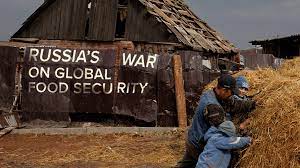The surging commodity and goods prices have not only become onerous to the public but have also brought a distressing socio-economic imbalance to the country, thus calling for the government’s intervention.
The current situation may stem from the battlefield in Europe, where Russia and Ukraine are locking-horns for their neighbourhood disputes that do not affect Lesotho directly, but an old- aged-adage that declares that “when two elephants fight the grass suffers†has come to life.
Soon Basotho lives will not anyhow differ from those of Ukrainians who have fled their country due to the hostile situation of shelling and bombs. The same antagonistic condition is already hitting the Mountain Kingdom, although in a different form.
It is a battle of poverty that rampages in Lesotho while the skyrocketing food prices add more woes, particularly cooking oil, wheat and grains. The same feat comprises fuel and paraffin that leaves vulnerable Basotho in the cold without a penny to purchase a M16 litre of paraffin now at the inception of winter, a bitter pill to swallow.
While the poor Basotho are grinding teeth shivering in the cold, some honourables in government are enjoying the warmth of their houses with M5000 petrol allowances to gallivant the corners and every bar of Maseru and the country.
A petrol93 amounts to M20.50, Petrol95 costs M20.80, Diesel cost M22.95 and Paraffin amounting to M16.90.
It was during the presentation of this year’s budget speech when the Principal Secretary of the Ministry of finance Nthoateng Lebona said the fiscal strategy on the mobilisation and financing as well as on the expenditure policies tried to accommodate whatever risks that may arise.
However, up to this far the government has been keeping quiet about its intervention to subsidise the increased cost of commodities – food and fuel in order to have prices reduced back to normality.
“We decided to reduce our deficit so that we may not close the opportunities to have another loan in times of unexpected disasters. The small space will enable us to borrow money when there are risks or we can also cut-off some of the items in the budget when the situation dictates.
She said when Covid-19 surfaced; they had to cut-off or suspend some items in the budget so that the expenditure may not go above par.
“We have to look at those two sides so that the situation may not go out of hand, lest we find ourselves in economic crises because if things get out of control it might be expensive to borrow.â€
She said they were in talks with investors to create a fund called Disaster Risk Management Fund so that they keep on injecting the money there.
She continued that the similar feat can best be demonstrated in projects where one will have to save the money for times of catastrophe, which will have to reduce the productivity of the project and some items in the project may not be utilised to accommodate the incumbent crises.
She said they were also working with IMF and World Bank that there should be a facility of catastrophes that will aid during the time of catastrophe to alleviate the problems.
“Those are our kind of medium plans that we are going to implement with the necessary terms of where the policies should change until the facility is well established. But we first have to start at home to make sure that the government has the necessary cushions instead of running out to seek for help.â€
It is sad that these are the kind of leaders some parochial electorate are proud of and would cast their vote in their favour despite their ineptness, poor service delivery and selfishness.
Summary
- The same feat comprises fuel and paraffin that leaves vulnerable Basotho in the cold without a penny to purchase a M16 litre of paraffin now at the inception of winter, a bitter pill to swallow.
- It was during the presentation of this year’s budget speech when the Principal Secretary of the Ministry of finance Nthoateng Lebona said the fiscal strategy on the mobilisation and financing as well as on the expenditure policies tried to accommodate whatever risks that may arise.
- She continued that the similar feat can best be demonstrated in projects where one will have to save the money for times of catastrophe, which will have to reduce the productivity of the project and some items in the project may not be utilised to accommodate the incumbent crises.

Your Trusted Source for News and Insights in Lesotho!
At Newsday Media, we are passionate about delivering accurate, timely, and engaging news and multimedia content to our diverse audience. Founded with the vision of revolutionizing the media landscape in Lesotho, we have grown into a leading hybrid media company that blends traditional journalism with innovative digital platforms.








